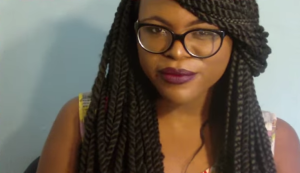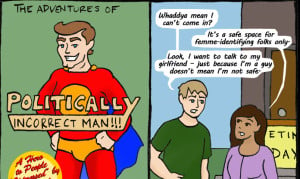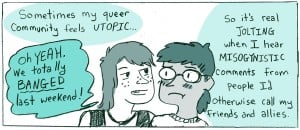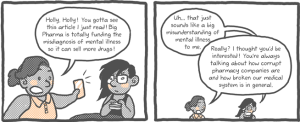Title: Feminist Vocabulary 101: Reproductive Rights: What They Are – Why We Need Them
Panel 1
Text: What do these people have in common?
(Group of people holding up signs)
Person 1: We need paid parental leave!
Person 2: Healthcare is a human right!
Person 3: Stop defunding family support services!
Person 4: “Crisis Pregnancy Centers” hurt women!
Text: They are all fighting for their reproductive rights.
Panel 2
Robot Hugs: “Reproductive rights” or “reproductive choice” is a term we use when we’re talking about the ability of every individual to have control over whether, when, and how they have or do not have children.
(Images of a single person, a couple, a couple with children, a single person with a child)
Panel 3
Text: Reproductive rights are most visibly present in the ongoing issues around restricting people’s ability to obtain abortions.
Person 5 to lawmaker: Oy! Keep your laws out of my uterus, buddy!
Panel 4
Text: However, reproductive choice also concerns issues such as access to birth control, fertility treatments, pregnancy care and support, medical treatments, and birthing options, as well as extended issues around raising a family.
Panel 5
Text: Factors influencing reproductive rights are present at every level of society:
Government (bill that says “72 hour waiting period”): Laws and legislation imposing medically unnecessary restrictions on how a doctor and patient can manage reproductive decisions.
Education (book titled “Abstinence Only”): Misleading or incomplete education to help individuals decide and control whether or when to have children
Criminal (person behind bars): Severely restricted pregnancy and abortion care, coercion towards sterilization, lack of access to children
Community (set of houses): Community values and/or environment that make pregnancy and child raising risky.
Economic (person holding a baby and a set of bills): Lack of support services, including financial aid and insurance, and prohibitively expensive procedures
Medical (doctor with crossed arms): Biased medical systems that devalue body autonomy and individual choice
Family (a family fighting): Coercion or shame around sex and pregnancy, risk of loss of shelter
Partnerships (condom packet with a safetyy pin though it): Abusive, co-dependant, or unhealthy partnerships that compromise family planning options
Individual (a person with question marks): Internal moral ambiguity around various options for reproductive decisions.
Panel 6
Text: Here are some examples of issues around reproductive choice.
Pregnant Person: My doctor is pressuring me to have a cesarean section.
Person Holding Child: I didn’t want to become pregnant, but my pharmacy wouldn’t give me any Plan B.
Couple: We so badly want children, but we just can’t support them on our income.
Person 6: My fetus has an abnormality. I don’t know what to do. I don’t know what it means. I’m scared.
Person in Pain: My periods are cripplingly painful, and it’s stopping me from working, but no doctor will agree to provide a hysterectomy to someone in their 20s…
Person in Prison Uniform: When I gave birth, they shackled me to a table, and then they took my baby away.
Person Holding a “Black Lives Matter” Sign: I’m frightened that I can’t guarantee that my future children will be safe
Person 7: My boyfriend said he’d leave if I didn’t get an abortion.
Person in Wheelchair: None of my doctors know anything about what pregnancy would be like with my disability.
Person Holding Paperwork: My insurance doesn’t cover a midwife.
Person 8: I didn’t want to give him up for adoption, but I was 17 and homeless.
Person 9: I’m a pregnant trans man. Most of the world either doesn’t know I’m possible, or thinks I’m a joke.
Panel 7
Text: We usually speak about reproductive rights in terms of pregnancy, adoption, or abortion, and pro-choice and anti-choice positions.
(Multiple choice boxes saying “have child,” “give up for adoption,” “have abortion,” and “Pro-Choice,” “Anti-Choice,” and “It’s complicated”)
Panel 8
RH: But it’s important to remember that to comprehensively address each individual’s right to make full informed and independent decisions about reproduction and families, we need to address systems such as:
Text: Ableism
Person 10: My doctor told me that “people like me” shouldn’t get pregnant.
Text: Racism
Person Holding Child: I’m Inuit, and my community has an infant mortality rate four times higher than the rest of Canada.
Text: Poverty
Person 11: I can’t afford to buy birth control, and my government’s social support programs don’t cover it.
Text: Education
Person Holding Up Condoms: We were taught in school that condoms were useless.
Text: Homophobia
Couple: There are still agencies that refuse to adopt to us.
Text: Transphobia
Person Holding Up Passport: My government requires me to get genital surgery to recognize my gender – essentially I have to be sterilized for the government to recognize me.
Text: Slut-Shaming
Person 12: My family threw me out of the house when I got pregnant.
Text: Medical Assault
Person 13: When I was in labor, my doctor performed an epistiotomy on me without my consent.
Panel 9
Text: Because we deserve this.
Couple: We’re waiting to have a family.
Person Holding Child: I was able to work with my doctor to come up with a birth plan that works.
Triad: We’re starting fertility treatments next month.
Person 14: My abortion was safe, accessible, and compassionate.
Person 15: I am able to find the birth control that works best for me.
Person 16: I am not planning on having children.
Person 17: I was able to access medical procedures that made me healthier and improved my life.
Person with Family: I know my children will be cared for.
Panel 10
Text: Not this:
Person 18: I didn’t have a choice.
























